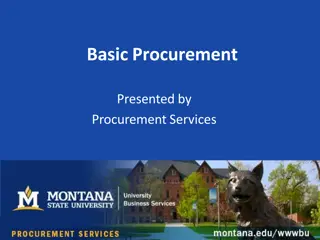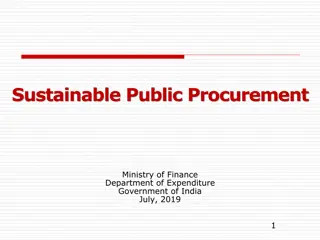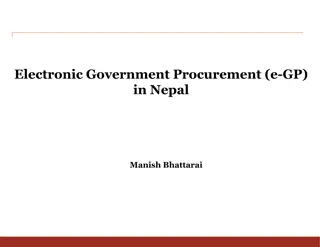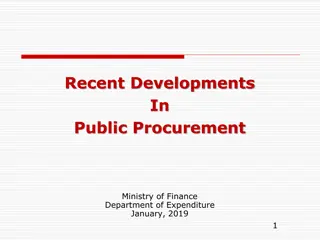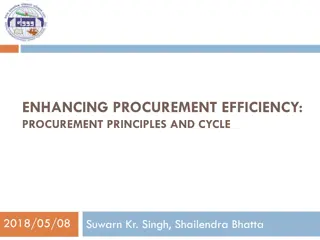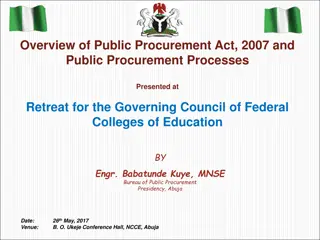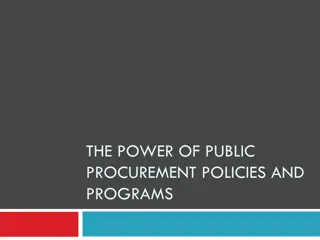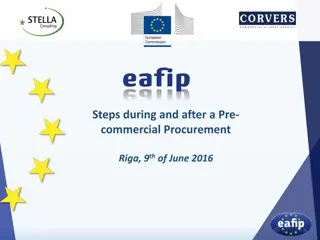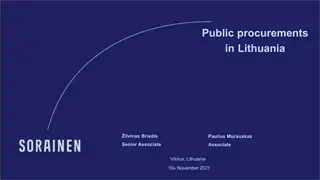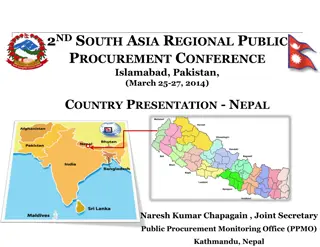Understanding Public Procurement: Overview, Principles, and Processes
Introduction to public procurement by V.K. Mathur, covering existing provisions, principles, weaknesses, and the way forward. Explains the UN definition of procurement, the Public Procurement Bill of 2012, and the process involved in timely determination of requirements, bidding, acceptance, and monitoring. Emphasizes the importance and impact of government procurement on transparency, competition, economy, efficiency, and accountability.
Download Presentation

Please find below an Image/Link to download the presentation.
The content on the website is provided AS IS for your information and personal use only. It may not be sold, licensed, or shared on other websites without obtaining consent from the author. Download presentation by click this link. If you encounter any issues during the download, it is possible that the publisher has removed the file from their server.
E N D
Presentation Transcript
Introduction to Public Procurement by V K Mathur Ex General Manager (MM & Mktg), Steel Authority of India Ltd. https://www.materialsmanagement.info https://www.materialsmanagement.info
Outline of Presentation Public Procurement Existing Provisions Principles laid down by Supreme Court Weaknesses Way forward Salient features of Public Procurement Bill Procurement Audit Check List
What is PROCUREMENT ? United Nations Commission On International Trade Law (UNCITRAL) Procurement means the acquisition of goods, construction or services by a procuring authority. United Nations Procurement functions include all actions necessary for the acquisition, by purchase or lease, of property, including products and real property, and of services, including works. Public Procurement Bill 2012 Procurement or public procurement means acquisition by purchase, lease, licence or otherwise of goods, works or services or any combination thereof, including award of Public Private Partnership projects, by a procuring entity, whether directly or through an agency with which a contract for procurement services is entered into, but does not include any acquisition of goods, works or services without consideration, and the term procure or procured shall be construed accordingly.
Timely Determination of Requirements (Goods/Works/ Services) Availability of Funds and Land & Statutory Clearances wherever required Payment Finalization of Technical Specification & Commercial Conditions Invoice Verification Mode of Bidding -Open Tendering -Limited Tendering -Nomination Cycle Procurement Acceptance of Goods/works/services Type of Bidding -Single Stage Single Envelope -Single Stage Two Envelope -Two Stage Contract Monitoring/Follow up Bid Submission/Receipt -e-bids -paper bids -Award to Lowest Evaluated Responsive Bidder -Contract Signing - Performance Guarantee Submission Bid Evaluation -General Compliance to Bid Conditions -Qualification of Bidder -Technical & Commercial Compliance -Capacity & Capability of Bidder -Price
Public Procurement Government procurement, also called public tendering or public procurement, is the procurement of works, goods and services on behalf of a public authority, such as a government agency. Awell functioning procurement system can be said to be in place if it achieves the objectives of transparency, competition, economy, efficiency, fairness and accountability. As the economy grows, the size of public expenditure becomes larger and procurement is one of the most important activities in governmental operation. Therefore, public procurement can influence many areas and change the way of doing things in the nation. That is the power of public procurement.
Constitutional provisions The Constitution of India authorises the Central and State Governments to contract for goods and services in the name of the President of India or the Governor of the State (respectively), and directs autonomy in public spending. However, it does not stipulate any procurement policies or procedures.
Legislative provisions There is no comprehensive central legislation exclusively governing public procurement. Nonetheless, various procurement rules and policies are guided by central legislations such as the Contract Act 1872, Sale of Goods Act 1930, Prevention of Corruption Act 1988, Arbitration and Conciliation Act 1996, etc. In addition, certain states, like Tamil Nadu, Karnataka, Andhra Pradesh, Assam and Rajasthan have enacted state-specific legislation such as the Tamil Nadu Transparency in Tenders Act, 1998, Karnataka Transparency in Public Procurement Act, 1999, the Rajasthan Transparency in Public Procurement Act, 2012, etc., that govern procedure for procurement in these states.
Administrative guidelines Comprehensive administrative rules and directives on financial management and procedures for government procurement are contained in the General Financial Rules ("GFR") initially implemented in 1947 and last modified in 2017. All government purchases must strictly adhere to the principles outlined in the GFR, which include specific rules on procurement of goods and services and contract management. In 2017, the government issued the Public Procurement (Preference to Make in India) Order 2017 which grants purchase preference to local suppliers based on certain conditions so as to promote manufacturing and production of goods and services in India.
Principles laid down by Supreme Court Government organizations are not allowed to work in secrecy in dealing with contracts, barring rare exceptions. Reasons for administrative decisions must be recorded, based on facts or opinions of knowledgeable persons again based on facts. Tendering Process or Public Auction is the basic requirement for the award of any contract. Adequate publicity is essential. Officers engaged in public procurement have to perform fiduciary duty. There has to be fair play in the actions for procurement. Bid evaluation has to be strictly in accordance with the bid evaluation criteria stated while inviting the bid.
Executive Instructions Rules, Guidelines Governing Public Procurement : General Financial Rules (GFR), 2017 State GFRs Delegation of Financial Powers Rules (DFPR), 1978 Guidelines issued by the Central Vigilance Commission (CVC) Guidelines issued by the Directorate General of Supplies and Disposal (DGS&D) Manuals on the procurement of goods, services and works issued by the Department of Expenditure, Ministry of Finance. Guidelines on procurement issued by individual Ministries / Departments, PSUs etc. Legislation on procurement enacted by individual states - Tamil Nadu and Karnataka
Other Laws relevant to public procurement Transparency, competition and curbing of probity issues are further ensured through: Competition Act, 2002: Penalises anti-competitive activities such as bid rigging, collusive bidding, cartelisation etc. Right to Information Act, 2005: Promotes transparency in government dealings by entitling Indian citizens to expeditiously procure information from the government Integrity pact under the GFR and CVC guidelines: Addresses probity in procurement activities including through the appointment of an external monitor to mitigate corruption and ethical risks. Prevention of Corruption Act, 1988 and Prevention of Money Laundering Act, 2002: Penalise bribery and money-laundering
Entities covered by legislation as Purchasers Government and government agencies Entities otherwise deemed to be 'state entities' for the purposes of the Constitution All ministries and departments of the Central and State Governments Corporate entities owned/controlled by central or state governments, public authorities exercising statutory powers Autonomous bodies that are created or owned by, or receive grants from, the Government Entities whose services are being utilised by the entities mentioned above
General Financial Rules (GFR) 2017 GFR contains a few chapters specific to public procurement : Chapter 5 outlines the concerned rules for the procurement of works Chapter 6 outlines the rules for procurement of goods and services Chapter 8 describes the contract management issue
Main features of GFRs Defines works, goods, and services to be procured and the scope of public procurement Outlines the fundamental principles of public procurement like enhancing transparency and efficiency, instilling fair practice, and promotion of competition Describes different procurement methods and their applicability Prescribes Code of Integrity Specifies tender award criteria Outlines general principles and rules of contract management
Financial thresholds for determining individual contract coverage GFR applies to all instances of procurement of goods required for use regardless of the value of the goods. However, monetary thresholds are involved in the following instances under the GFR: Purchases of up to INR 250,000 can be made at the discretion of the ministry/department by issuing purchase orders containing basic terms and conditions For works contracts valued at: (a) INR 100,000 INR 1,000,000, the letter of acceptance will result in a binding contract (subject to certain conditions of contract being included in the tender document); and (b) INR 1,000,000 and above, a contract must be executed (which can be a "simple one page contract" where preceded by an invitation to tender and conditions of contract)
Financial thresholds for determining individual contract coverage contd. Goods can be purchased without inviting bids: (a) on the basis of a certificate from the competent authority, where the goods are of up to INR 25,000 in value; and (b) on the recommendation of the relevant Local Purchase Committee if between INR 25,000 and INR 250,000 in value. A limited tender enquiry (with no advertisement necessary) can be pursued for goods valued less than INR 2,500,000.
Financial thresholds for determining individual contract coverage (contd2) The monetary ceilings for direct online purchases on the Government e-Marketplace ("GeM", a portal for the purchase of common use goods and services) are as under: up to INR 50,000: through any of the available eligible suppliers on GeM; INR 50,000 INR 3,000,000: eligible GeM seller having the lowest price of amongst at least three different manufacturers; and over INR 3,000,000: eligible supplier having the lowest price after mandatorily obtaining bids using the online bidding/reverse auction tool.
Overseers The framework is bolstered by authorities including: the Central Vigilance Commission ("CVC") tasked with increasing transparency and objectivity in public procurement; the Competition Commission of India ("CCI") which checks anti-competitive elements; and the Central Bureau of Investigation ("CBI") engaged for investigation and prosecution of the criminal activities in the procurement process such as probity issues. Audit (CAG)
Principles of Public Procurement Economy : Getting the right thing at the right price -Value for Money (vfm) Efficiency :Arrival of item in the right place at the right time for its intended use -Money for Value(mfv) Transparency: letting everyone know ,not only the facts and figures of procurement but also the mechanisms and procedures followed Equal Opportunity and Fairness: Being objective and ensuring impartial, unbiased and equitable treatment of tenderers by conforming with rules and standards free from discrimination and dishonesty
Fundamental approach Open tendering Effective Advertisement Non-discriminatory tender conditions & Technical specifications Public tender opening Award to most advantageous bidder
Weaknesses in the existing system Absence of a dedicated Policy making Department Absence of Legal Framework Absence of Standard Documents Nomination basis Limited number of Suppliers / List of Registered Vendors Two Envelope System Delay in Tender Processing and Award Decision Works contract Negotiation
Way Forward Public Procurement Law Institutional framework preferably dedicated department/unit within the Ministry of Finance Standardization including the procedures, tender documents and general conditions of contract Competitive bidding should be the norm for procurement unless permitted and justified in special cases I. Evaluation criteria should be clearly spelt out in tender documents II. Evaluation as per the declared criteria III. Public opening of tendering should be mandatory IV.Introduce debriefing procedure V. Result of the tendering process in the Public domain
Switch over to e-procurement regime (Korea Online E-procurement System) Reforms in works Procurement For all development projects, the executing agencies shall carry out procurement planning (statutory clearances, land acquisition & packaging, scheduling and firming up of funds before sanction. availability), logistics, contract Schedule of rates should be reviewed and revised Contractors past performance data should be maintained Bid capacity Finance, equipment, personnel & past performance should be mandatory criteria Regular Training Programmes Performance Indicators
The Public Procurement Bill Objectives (2012,2015) A legislation to regulate public procurement by all Ministries and Departments of the Central Government, Central Public Sector Enterprises, Autonomous and Statutory bodies controlled by the Central Government and other procuring entities; Ensuring transparency, fair and equitable treatment of bidders, promoting competition and enhancing efficiency and economy in the procurement process; Maintaining Integrity and public confidence in public procurement process
Basic Features Five Chapters (Preliminary ,Principles & Methods of Procurement ,Institutional Mechanism, Offences penalty & debarment ,Miscellaneous) To be supplemented by Rules for procurement of Goods, Works and Services. Separate sets of Rules for: Procurement for the purpose of national security Entering into Public Private Partnerships Procurement by Central Public Sector Enterprises Exemptions from the law in certain circumstances Key transparency and accountability norms incorporated from international best practices Expeditious and streamlines grievance redressal procedure
Procurement Audit Check List (1) Whether the procurement plans, and APP prepared and displayed? Whether the procurements were made as per the procurement plan? Whether the method adopted for procurement and all the steps as per the purchase policy were Taken? Whether the Tender Selection Committee/ Evaluation Committee was constituted and involved in the procurement procedure?
Procurement Audit Check List (2) Whether the overall procurement was done within a reasonable time? Whether there was any avoidable delay at any stage/ stages of the procurement process? Whether the necessary approval(s) was taken from appropriate authority wherever required?
Procurement Audit Check List (3) Whether proper and adequate documents were maintained? Whether the pre-qualification screening for issue of tender documents was done properly and in a fair manner? Whether the technical and financial evaluation was done properly and in fair manner?
Procurement Audit Check List (4) Whether the contracted firm, supplied the goods or executed the work as per the quality, quantity and price indicated in the contract agreement/ supply order? Whether the goods were supplied or works executed in time and properly recorded in measurement books and stock/works registers after inspection?
Procurement Audit Check List (5) Whether the payment was made to the supplier/ contractor within the time frames indicated in the contracts? If not, reasons for delay. Whether the EMDs and securities were returned within the time frames indicated in the contracts? If not, reasons for delay.
Summing up. India's regulatory and institutional framework seek to ensure responsibility, accountability and efficiency in the public procurement regime. The underlying principle is to procure materials/services of specified quality at the most competitive prices in a transparent and non-arbitrary manner
Thank you Have a nice day V K Mathur https://www.materialsmanagement.info





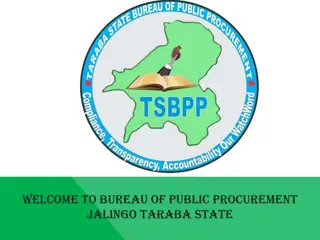
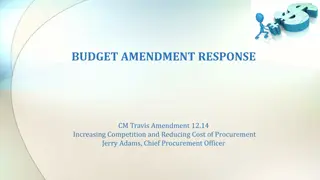
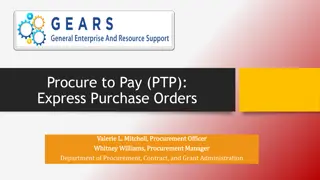
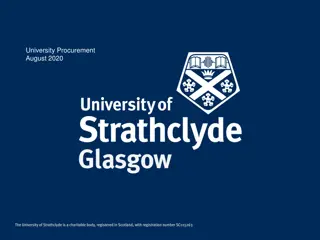
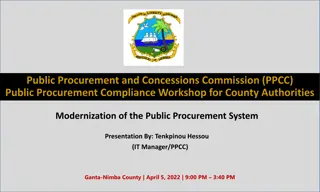
![Comprehensive Overview of Corruption Watch Submission on Public Procurement Bill [B18B-2023]](/thumb/138344/comprehensive-overview-of-corruption-watch-submission-on-public-procurement-bill-b18b-2023.jpg)
